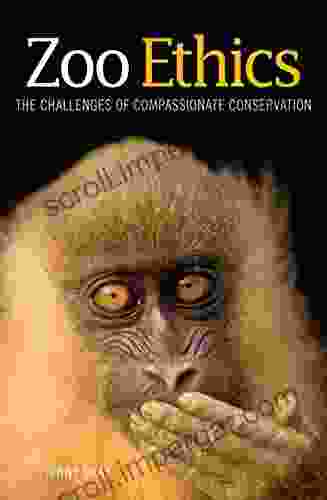Zoo Ethics: The Compelling Dilemmas of Animal Welfare and Conservation

As society's understanding of animal sentience evolves, the ethical implications of confining animals in zoos for the sake of conservation, education, and entertainment have become increasingly scrutinized. The book "Zoo Ethics: The Challenges of Compassionate Conservation" delves into this complex and nuanced topic, grappling with the ethical questions that arise at the intersection of human intentions and animal well-being.
The Ethical Tightrope: Animal Welfare vs. Conservation
At the heart of the zoo ethics debate lies the tension between animal welfare and conservation. Zoos aim to protect endangered species, promote biodiversity, and educate the public about wildlife. However, the confinement and restrictions inherent in zoo life can compromise an animal's physical, psychological, and social well-being.
The book's authors, Lori Gruen and Dale Jamieson, argue that zoos must prioritize animal welfare without undermining their conservation mission. They call for a shift in zoo practices, advocating for species-appropriate habitats, cognitive stimulation, and the recognition of animals as individuals with intrinsic value, not merely tools for human objectives.
4.6 out of 5
| Language | : | English |
| File size | : | 702 KB |
| Text-to-Speech | : | Enabled |
| Enhanced typesetting | : | Enabled |
| Word Wise | : | Enabled |
| Print length | : | 256 pages |
| Screen Reader | : | Supported |
The Moral Dilemma of Captivity
The ethics of keeping animals in captivity is a central theme in "Zoo Ethics." The authors explore the concept of "speciesism," the idea that humans are inherently superior to other species and therefore have the right to exploit them. They argue that animals' capacity for suffering and their inherent value as sentient beings should override any perceived benefits of keeping them captive.
The book examines the arguments made in favor of zoos, such as their role in species preservation, education, and scientific research. However, it also questions the effectiveness of zoos in achieving these goals, highlighting the often limited success of captive breeding programs and the potential for zoos to perpetuate distorted views of wildlife.
Exploring Alternatives to Captivity
Recognizing the ethical challenges of captivity, "Zoo Ethics" explores alternative approaches to conservation that do not involve confining animals. The authors discuss the potential of in-situ conservation efforts, which focus on protecting and restoring wildlife habitats in the wild. They also examine emerging technologies, such as virtual reality, that offer innovative ways to educate the public about wildlife without resorting to live animal exhibits.
The book emphasizes the need for a fundamental shift in our relationship with animals, one that values their intrinsic worth and recognizes the limits of human control. It calls for a compassionate approach to conservation that seeks to preserve wildlife in a manner that respects their autonomy and well-being.
The Path to Compassionate Conservation
"Zoo Ethics" offers a comprehensive and engaging analysis of the ethical dilemmas facing zoos. It provides a compelling case for rethinking our approach to animal captivity and for developing conservation strategies that prioritize the well-being of individual animals.
The book's authors conclude by outlining a set of principles for compassionate conservation:
- Animal welfare must be paramount: Animals should not be subjected to undue suffering or distress in the name of conservation.
- Species should only be kept in captivity when it supports their recovery or welfare: Zoos must demonstrate a clear need for captive breeding and the ability to provide species-appropriate care.
- Zoos must provide transparent and accountable information about their animals: The public has a right to know the conditions under which animals are kept and to hold zoos responsible for their ethical practices.
- Alternatives to captivity should be prioritized: Zoos should explore and invest in innovative approaches to conservation that do not involve animal confinement.
"Zoo Ethics: The Challenges of Compassionate Conservation" is a timely and thought-provoking examination of the ethical implications of zoos. It challenges traditional views on animal captivity and advocates for a compassionate approach to conservation that respects the inherent value of all living beings.
As the public discourse on animal welfare continues to evolve, this book serves as an essential resource for anyone interested in the complex intersection of ethics, conservation, and the treatment of animals in captivity.
4.6 out of 5
| Language | : | English |
| File size | : | 702 KB |
| Text-to-Speech | : | Enabled |
| Enhanced typesetting | : | Enabled |
| Word Wise | : | Enabled |
| Print length | : | 256 pages |
| Screen Reader | : | Supported |
Do you want to contribute by writing guest posts on this blog?
Please contact us and send us a resume of previous articles that you have written.
 Book
Book Novel
Novel Page
Page Chapter
Chapter Text
Text Story
Story Genre
Genre Reader
Reader Library
Library Paperback
Paperback E-book
E-book Magazine
Magazine Newspaper
Newspaper Paragraph
Paragraph Sentence
Sentence Bookmark
Bookmark Shelf
Shelf Glossary
Glossary Bibliography
Bibliography Foreword
Foreword Preface
Preface Synopsis
Synopsis Annotation
Annotation Footnote
Footnote Manuscript
Manuscript Scroll
Scroll Codex
Codex Tome
Tome Bestseller
Bestseller Classics
Classics Library card
Library card Narrative
Narrative Biography
Biography Autobiography
Autobiography Memoir
Memoir Reference
Reference Encyclopedia
Encyclopedia Drew Young
Drew Young Calvin Schermerhorn
Calvin Schermerhorn Carma Chan
Carma Chan Joanne Watchie
Joanne Watchie David Bach
David Bach Carol Wayne White
Carol Wayne White Takefumi Matsuo
Takefumi Matsuo Cassie Willows
Cassie Willows Jesse Adler
Jesse Adler Charles B Macdonald
Charles B Macdonald Carolyn Wnuk
Carolyn Wnuk Todd C Elliott
Todd C Elliott Caroline Oliver
Caroline Oliver Charissa N Terranova
Charissa N Terranova Paul Breon
Paul Breon Pamela Holberton
Pamela Holberton John Walkenbach
John Walkenbach Richard Allen
Richard Allen Carol Gilligan
Carol Gilligan Carla Willig
Carla Willig
Light bulbAdvertise smarter! Our strategic ad space ensures maximum exposure. Reserve your spot today!

 Dean ButlerSoftware Development and Quality Assurance for the Healthcare Manufacturing...
Dean ButlerSoftware Development and Quality Assurance for the Healthcare Manufacturing... Gary CoxFollow ·16.2k
Gary CoxFollow ·16.2k Franklin BellFollow ·13k
Franklin BellFollow ·13k Hugh ReedFollow ·18.5k
Hugh ReedFollow ·18.5k Joseph FosterFollow ·7.9k
Joseph FosterFollow ·7.9k Hudson HayesFollow ·10.8k
Hudson HayesFollow ·10.8k Art MitchellFollow ·3.1k
Art MitchellFollow ·3.1k Zadie SmithFollow ·16k
Zadie SmithFollow ·16k Darnell MitchellFollow ·16.9k
Darnell MitchellFollow ·16.9k

 Henry Hayes
Henry HayesVery Short Introductions: A Gateway to Knowledge...
In the realm of academia, where vast oceans of...

 Jean Blair
Jean BlairBorn on the Third of July: An Unforgettable Journey of...
Born on the Third...

 Benjamin Stone
Benjamin StoneEnvironmental Offsets: Striking a Balance between...
In the face of pressing environmental...

 Colin Foster
Colin FosterGirl With Power: My Boyhood Bully Diary
In this gripping and...

 Colin Foster
Colin FosterUnveiling the Unseen: The Collected Works of Charles Fort
Prepare to venture into...

 Gabriel Mistral
Gabriel MistralUnveiling the Hidden World of the English Republican...
Dive into the captivating world of 'The...
4.6 out of 5
| Language | : | English |
| File size | : | 702 KB |
| Text-to-Speech | : | Enabled |
| Enhanced typesetting | : | Enabled |
| Word Wise | : | Enabled |
| Print length | : | 256 pages |
| Screen Reader | : | Supported |










